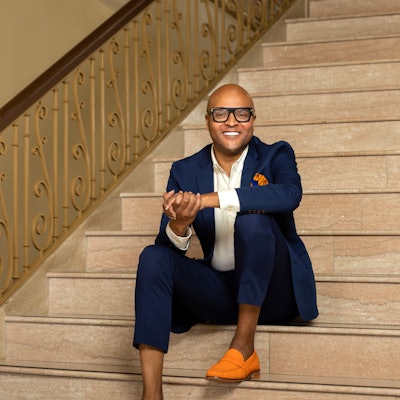Dr. Steve D. Mobley Jr. Title: Assistant Professor of Higher Education Administration, Department of Educational Leadership, Policy, and Technology Studies, University of Alabama Education: B.A., communication and culture, Howard University; M.S.E.d., higher education management, University of Pennsylvania; Ph.D., educational policy and leadership, University of Maryland, College Park Age: 38 Mentors: Dr. D-L Stewart, University of Denver; Dr. Kimberly Griffin, University of Maryland; Dr. Noah Drezner, Columbia University; Dr. James Earl Davis, Temple University. Words of encouragement/wisdom: “Stand by what you believe in, even if it’s unpopular, and do the work that you want to do. And that does not come without risk. I would be the first to say that a lot of the decisions I’ve made — they’re risky.” |
If he had to sum up his scholarship in one line, Dr. Steve D. Mobley Jr. would tell you he is “complicating Blackness within higher education settings.”
An assistant professor of higher education administration in the Department of Educational Leadership, Policy, and Technology Studies at the University of Alabama, Mobley’s most widely known work centers around the experience of Black students — particularly those who identify as queer or transgender — at historically Black colleges and universities.
“When I was a doctoral student, I would see a lot of scholarship on Black students, but we weren’t delving into this research intersectionally,” says Mobley, whose research interests are a reflection of his own lived experiences as a low-income, first-generation undergraduate student at Howard University. At the elite HBCU, he also struggled with his identity as a gay man.
His experiences at Howard generated an interest in unpacking classism and elitism at historically Black institutions, which has also been a primary focus for his work. During the first year of his doctoral studies at the University of Maryland — the same year Morehouse College issued a dress code banning students from donning “clothing traditionally worn by women” — he began to tackle the respectability policies of gender and sexual identity on these campuses.
 Dr. Steve D. Mobley Jr.
Dr. Steve D. Mobley Jr.
It was particularly disheartening, he continues, because Black students who choose to matriculate through HBCUs are going for an affirming experience. “They’re wanting that supportive, nurturing familial life experience, and then to be told by people who look like you that you’re somehow wrong or you need to be fixed — I said I need to delve more deeply into that,” he says.
Mobley admits he still doesn’t have the answers. He still doesn’t know how to make campuses a more welcoming environment for Black students and all of their intersectional identities and he still doesn’t know why some students of color don’t continue their studies, even when accounting for financial need, or how to keep them there. The latter question, he says, led him to the University of Maryland to pursue his Ph.D. in educational policy & leadership with an emphasis on higher education administration in the first place. But he’s thankful to have the space to sort through the answers and unpack “Black identities overall, not as a monolithic group.”
In his nominating letter, Dr. Donald Mitchell II, Bellarmine University’s chief diversity, equity and inclusion officer, writes, “Dr. Mobley’s scholarship on HBCUs is remarkable, timely and contributes significantly to our field. … The research and scholarship that Dr. Mobley produces will have a lasting impact on his university community, the field of higher education, the nation, and beyond.”
And the impact is already being made; Mobley has published 11 peer-reviewed journal articles, nine book chapters, multiple blog articles and has a forthcoming edited volume. He has given over 40 refereed presentations and has already been the recipient of numerous honors. In 2020, he was named an American College Personnel Association (ACPA) Emerging Scholar-Designee. And in 2019, he received ACPA’s Coalition on Men & Masculinities Tracy Davis Emerging Research Award and ACPA’s Coalition for Sexuality and Gender Identities Research Recognition award. His dissertation, “Difference Amongst Your Own: The Lived Experiences of Low-income African American Students and Their Encounters with Class within Elite Historically Black College Environments,” received three national awards.
“I think that most of why my work has been so well received is because I’m an HBCU alum and I’ve been able to engage with different HBCU presidents and they’ve supported my work,” he says. “Having that kind of support from HBCU communities has been instrumental.”
Above all else, Mobley holds dear advice he was given by Dr. Sharon Fries-Britt, a professor of higher education at the University of Maryland, whom Mobley describes as one of his mentors: “You have to know yourself deeply in order to navigate the academy,” he says, echoing Fries-Britt’s words.
This article originally appeared in the January 20, 2022 edition of Diverse. Read it here.


















